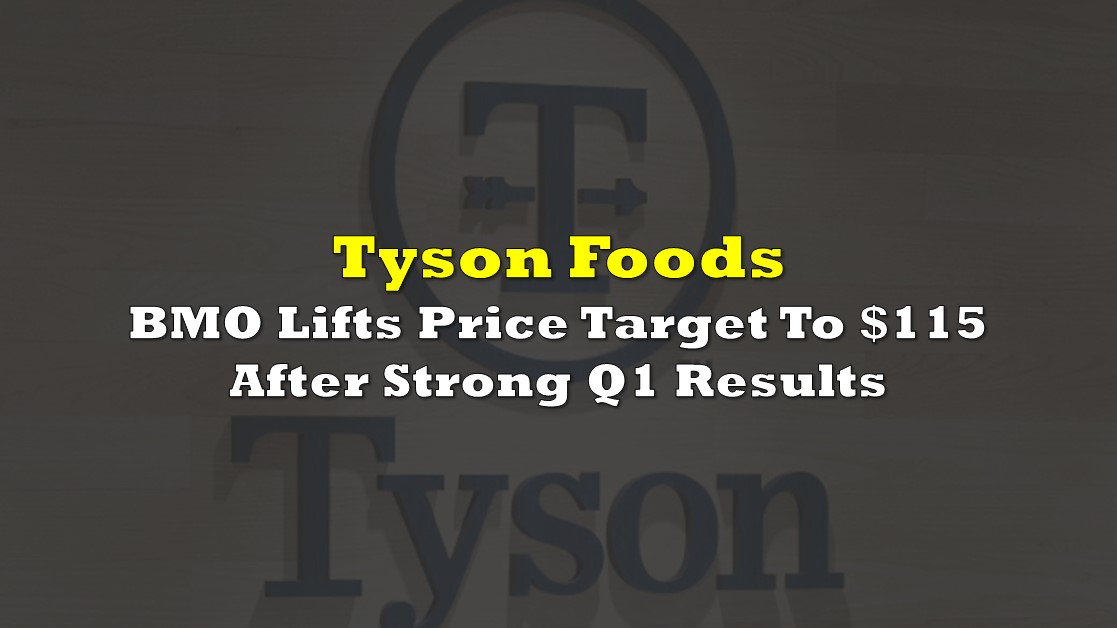On February 7th, Tyson Foods (NYSE: TSN) reported their fiscal first quarter results for the period ending December 31st. The company reported total revenues of $12.93 billion, up 23.6% year over year. Gross profits came in at $2 billion, or a 15.6% margin, up 55.4% year over year while net income grew over 100% year over year to $1.13 billion, or an 8.7% margin. This brings the companies earnings per share to a multi-year high of $2.87.
Tyson’s beat primarily comes from an average price increase of 19.6% in all their business segments. Beef average prices grew almost 32% year over year while pork and chicken grew 12.8% and 19.9% respectively. Even the prepared foods and international average prices saw an increase of 13% and 8.3%, respectively.
A number of analysts raised their 12-month price targets on Tyson Foods after the earnings results, bringing the average price target to US$101.18 from US$92. This represents a 3% upside to the current stock price. There are currently 15 analysts covering the stock, with 4 having strong buy ratings, another 4 analysts have buy ratings and the last 7 have hold ratings. The street high sits at US$115 by 2 analysts, which represents a 17% upside to the current stock price.
In BMO Capital Markets’ note, they reiterate their outperform rating and raise their 12-month price target from US$103 to US$115 saying that the company is showcasing strong underlying fundamentals while international operations continue to improve.
They say that these earnings have helped them gain confidence in their own outperform rating as the company continues to execute “a sound plan to restore its operations, particularly in terms of pricing, operational improvements, and capacity expansions.”
For the results, the company’s adjusted earnings per share exceeded their estimates, primarily due to beef, chicken, and prepared foods profits. First, the beef segment margins grew 500bps year over year to 19.1%, Chicken margins grew similarly to 3%, this comes even with all the covid-19 and inflation headwinds facing production and business logistics.

Though Tyson is continuing to face plant inefficiencies says BMO, with harvest capacity utilization rate in the low 80’s, high employee costs, and absenteeism. They believe that with the companies new vaccination policy and employee benefit initiatives, it is on track to achieve its $300 to $400 million productivity savings for fiscal 2022.
BMO believes that the company will continue to see strong beef margins through 2022, with it normalizing by the end of 2022. The current beef packer margins are at around $400 a head, or 6-7x normal margins. They expect this to continue as the demand for U.S beef around the world remains strong, as well as favorable trade deals helping. They also believe that there is a surge in China for beef, which Tyson with its supply chain in China, is perfectly positioned to be a winner.
Lastly, BMO expects Tyson will see an incremental 200-300bps in its profit through capital growth. They expect the company will see about $500 million in operational savings through improvements, digital solutions, and automation.
Below you can see BMO’s updated fiscal second quarter and full-year 2022 and 2023 estimates.

Information for this briefing was found via Sedar and Refinitiv. The author has no securities or affiliations related to this organization. Not a recommendation to buy or sell. Always do additional research and consult a professional before purchasing a security. The author holds no licenses.









